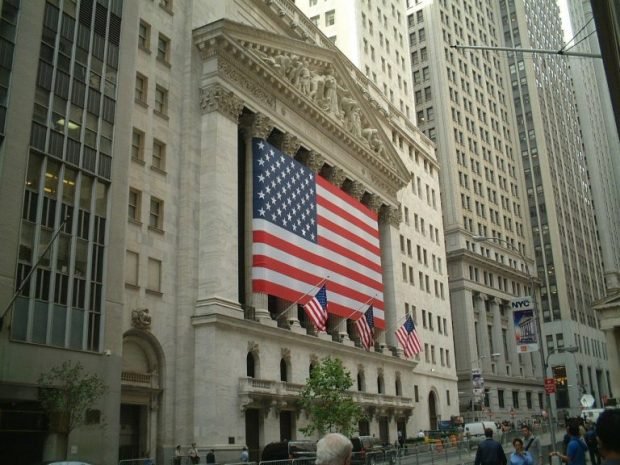A Post-September 11th America
 When the planes struck the towers of the World Trade Center, I was getting coffee at the pavilion of The University of Northern Iowa and didn’t realize that the images on the television were real. They seemed like special effects out of some really bad science fiction movie, “The Day After The Day After Tomorrow,” or some such standard Hollywood fare.
When the planes struck the towers of the World Trade Center, I was getting coffee at the pavilion of The University of Northern Iowa and didn’t realize that the images on the television were real. They seemed like special effects out of some really bad science fiction movie, “The Day After The Day After Tomorrow,” or some such standard Hollywood fare.
Then I noticed the buzz around me as students were murmuring and shuffling around in a state of shock. I asked a stunned redhead what had happened and she pointed to the screen and told me in a hushed voice, “The planes hit the towers.”
Such propelled millions of Americans into the “post-September 11th” world, though I must confess I never followed them. My reverence for the nation as it was before some jihadists with boxcutters turned some airplanes into missiles and took down a few buildings has remained unchanged. The handful of Islamic fundamentalists on those passenger jets killed thousands of my fellow countrymen that day, and for that I will never forget their despicable act, but sorry, I don’t plan on changing the way I see America or what it stands for.
You see, I had been studying terrorism for some time before that dreadful act and particularly, a now-famous organization called al Qaeda. The group, headed by Osama bin Laden and Ayman al-Zawahiri, had declared war against the United States not once, but twice under the Clinton administration and had carried out several coordinated terrorist attacks against American targets. The media’s and the political response were meager, if not meek. Perhaps it was better that way, if only we had went about the grim business of ending the terrorists then and there.
The first memorable attack was the initial World Trade Center bombing, which was covered like it was a crime drama pulled from the show CSI, and not an America-reorienting attack like its follow-up eight years later. The “Blind Sheikh” Omar Abdel-Rahman, an Egyptian with ties to al Qaeda’s al Zawahiri, had collaborated in the 1993 bombing. He was eventually imprisoned for life, without the fanfare and spectacle we would expect in the post-September 11th world.
There were the bombings in Kenya and Tanzania, which were page seven stories within days of their being carried out. As Clinton left office, there was the bombing of the U.S.S. Cole, which killed seventeen American sailors, and involved the collaboration of al Qaeda in Yemen. A warmed-over speech delivered by President Clinton as he left office sent the message that we would react to terrorism with a whimper and not a bang. Osama bin Laden had reinforcement for the “weak horse” comment that followed upon our military’s struggle with Somalian rebels in the Battle of Mogadishu in 1993.
So as the planes hit the towers on September 11th, I was clearly not nearly in the severe state of shock a lot of others were. The images were disturbing, haunting even, on an emotional level. But in my mind, I knew the attacks were the fruition of a weak, and more importantly, stupid foreign policy.
By that, I mean that I have always been a realist. I don’t believe in going abroad looking for monsters to slay, as John Quincy Adams put it, and I don’t believe in a weak, passive, or appeasing reaction to world events either. There are real, serious enemies of the United States, not simply because of its vast amount of economic and military power, but symbolically, for what it has stood for over two centuries, and namely: individual freedom.
But it has been the latter that has provoked the ire of dictators, radicals, and fundamentalists around the world more than the former. If America were a typical superpower, it would simply annex and formally absorb Canada, Mexico, Latin America, and most of South America and be done with it. That might actually be preferable to the despots of the world who resent and fear a beacon of liberty shining around the world to agitate their oppressed populaces for reforms or even inspire them to revolt. There is no revolution unless people can imagine a better way of life and feel they can act to make things different.
This is why the best thing America could have done after 9/11 is to be quiet, rebuild the towers, and to execute swift and deadly justice against those who actually perpetrated the act and those who assisted them. There was no need to overreact and to build a vast domestic security complex that showed how insecure we were as a superpower, diminished the brightness of our example as a nation and actually made the American people less secure in the long-term.
This point-of-view begs the alternative response. A strategy of military withdrawal from the Middle East, while developing our own vast oil, natural gas, coal, and alternative energy resources, is the obvious plan of action. This creates a power vacuum and the removal of a symbolic target that has brought together otherwise competitive terrorist groups and has salved fierce sectarian differences, namely between the Shi’ite and the various Sunni.
If anything, during the course of my studies of international relations at the undergraduate and doctoral level, I had learned the value of realism, both classical and neorealist. From Thucydides’ The History of the Peloponnesian War, a classic text I devoted an entire class to studying in grad school, or the neorealist Stephen Walt’s “balance of fear,” I appreciated that man has an aggressive side to his nature and that states in an “anarchic” world tend to balance against one another. Those states that do not help themselves tend to become vulnerable over time.
This is truly the conservative view of things: there are some things about human nature that can be learned and we can build upon that knowledge to make a better world; and namely, by protecting individuals against oppression, and not by trying to build some monolithic world society of altruistic people, who are not valued in and of themselves but for what they can do for their communities (read, the political oligarchy).
But conservatives have been divided in the post-September 11th world by two instincts: the one, the psychological need to face down and defeat evil, which is a natural and healthy instinct; and the other, the recognition that evil exists, will always exist, and should be allowed to exist in places of the world that do not concern us, in accordance with our view on free will. If people want to change their societies for the better, they could always look upon the United States as a shining light and choose the American way. Our responsibility would be for ourselves and doing the right thing as much as possible. Sufficient unto the day is the evil thereof.
So by allowing evil regimes to exist in the Middle East and removing ourselves from the territory, while quietly going about our business as a free, prosperous, and powerful nation, which neither appeases dictators nor seeks trouble, we could remain aloof from the petty barbaric squabbles that haunt unenlightened societies. The savage peoples of the world would be drawn to lash out; and yes, there would still be anti-modernist and anti-Western fundamentalists who would seek to attack America for symbolic reasons. Again, a realist is not a utopian and seeks to manage the risks and dangers of the world, not eradicate them.
Thus, we would be safer with nuclear-armed states concerned with one another, instead of the United States; such as with Pakistan and India. Additionally, pitting Iraq against Iran is bloody, Machiavellian politics, but is it better than perhaps fighting them both? We have to assume that states are rational actors, as in the case of Iran, while we prepare to retaliate for the unexpected or to preempt the clearly imminent strike.
When the states of the Middle East are divided, they might even turn to the United States; whether it be for the oil trade, in order to finance their regimes.
Instead, we have embarked upon a course of internal strengthening of the state and military adventurism abroad. It would be one thing to bring the terrorists who were harbored in Afghanistan to justice, but we have set upon a course of doing what the Romans, British, and Russians failed to do: to conquer and civilize the Afghani, who live at the crossroads of the world. We occupied Iraq and have turned over the government to the Iraqi people; mind you, a noble act and one for which our troops should be commended, but there is no guarantee of what the future brings there.
This is not to mention our blatantly unconstitutional military intervention in Libya, our meddling in Egypt, and our general fueling of a radical pan-Islamic movement in the Middle East under the guise of bringing “democracy” there. Hamas was democratically elected and it is a bloody and terroristic organization. Democracy is merely a form of government and should not be something in and of itself to promote, let alone by force. What America should promote is individual rights, free market capitalism so people can lift themselves out of poverty, and social and religious freedoms.
Short of that, we are kicking hornet nests around the world, selling people empty promises that “democracy” will make their lives better, spending trillions we don’t have, costing our military and our families thousands of lives, and diminishing liberty at home. That doesn’t sound like a post-September 11th world that this American can get behind.
Fly the flag high and don’t forget what it really stands for.



